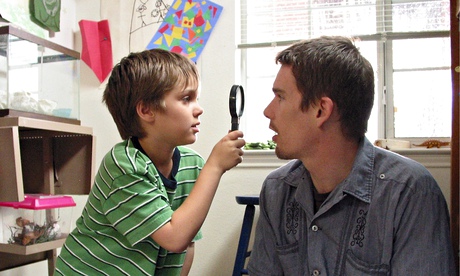
Like the fabled Jesuit, Richard Linklater has taken the boy and given us the man. In so doing, he's created a film that I love more than I can say. And there is hardly a better, or nobler thing a film can do than inspire love.
This beautiful, mysterious movie is a time-lapse study of Mason, growing up from around the age of five to 18, from primary school to his first day in college. It is an intimate epic: over 12 years, Linklater worked with the young actor Ellar Coltrane, shooting scenes every year with him and other cast members, who grow visibly and heart-stoppingly older around him. The director's daughter, Lorelei Linklater, plays Mason's older sister, Samantha; Patricia Arquette is superb as their divorced single mom, hard-working and aspirational, but worryingly condemned to hook up with drunks and give the kids abusive stepdads. Ethan Hawke – his lean, chiselled face softening as the years go by – plays the kids' feckless and unreliable but charming father, who shows up every few weeks in his cool car. And Mason's own face changes from its young, moony openness to a closed, grown-up handsomeness. It is the face he will learn to present to the world.
In some ways, the movie invites us to see Mason from an estranged-dad's-eye-view, alert to sudden little changes and leaps in height. As an unestranged dad myself, I scrutinised Coltrane at the beginning of each scene, fascinated and weirdly anxious to see if and how he'd grown. But the point is that all parents are estranged, continually and suddenly waking up to how their children are growing, progressively assuming the separateness and privacy of adulthood. Part of this film's triumph is how it depicts the enigma of what Mason is thinking and feeling.
Boyhood is so ambitous and passionate that I can't imagine anyone cranking out another conventional "coming-of-age" picture. That genre now looks to be obsolete. Which is not to say this film is utterly novel: audiences must remember Michael Apted's 7-Up TV documentary project. Michael Winterbottom did something similar with his long-gestating 2012 movie Everyday, interestingly another absent-father tale, this one of a family left behind when the dad goes to prison. And Linklater got Hawke and Julie Delpy to grow up and grow old in his Before movie series. There are other approximate examples: Robert Guédiguian, Steven Soderbergh and Mike Myers have used recycled "flashback" scenes of actors' younger selves from other films. Perhaps the nearest comparison for Ellar Coltrane and Mason is Daniel Radcliffe and Harry Potter – a connection to which Linklater subtly alludes.
But none of these cases really do justice to the substance and completeness of this one thrilling film. The long-term commitment required is such that conventional assessments of "performance" are almost beside the point.
The film director sculpts in time, Tarkovsky said, and Linklater, with no guarantee about how his raw material would turn out, has sculpted this monumental study of a boy. Or maybe it is that he and time collaborated in the sculpting, or that time actually sculpted Linklater and Coltrane. It is a kind of Bildungsroman for modern American cinema, conducted at a superbly intelligent, low-key level. All the familiar rites of passage are here, but presented evenly, without the cliched narrative beats – partly a function of the project's necessary open-endedness. Mason rarely, if ever, gets upset, although he comes near to tears in a debate with his dad about that flashy car while riding in his father's boring and dismaying new mini-van. The elderly parents of his dad's second wife turn out to be conservative Christians, who give this liberal kid a Bible and shotgun for his birthday. In another film, this would be the occasion for hammy arguments and a soupy resolution. Here, Mason accepts the gifts with reticent, diplomatic good-nature. Exactly what would probably happen in real life.
Boyhood is in touch with a simple, urgent truth: life is terrifyingly short. While our childhood in progress seems like an aeon, to our parents it flashes past in a dreamlike instant. Then to us, afterwards, it changes from an assumed sturdy narrative into a swirling constellation of remembered and half-remembered moments, which drift in and out of reach. It is with something like awe you grasp the obvious fact that Linklater's time-lapse technique could be easily applied to every other character in the film. Children and adults are not separate species.
Perhaps Linklater and Ellar Coltrane will come back for sequels: Manhood, Middle Age and so on. Part of me longs to see Mason again, and part thinks there is an exquisitely perfect humility in how the film gently leaves him with his new friends in college. Either way, it is one of the great films of the decade.
• Richard Linklater and Ellar Coltrane: 'Making Boyhood was a dear process'

